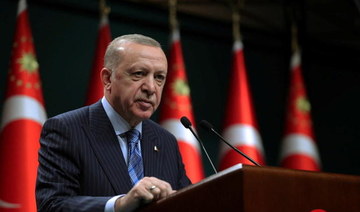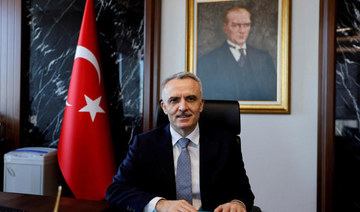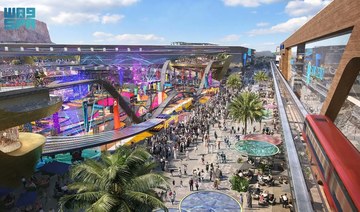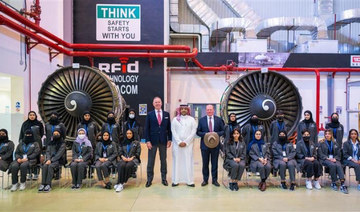IZIKDERE: Lush, thick woodland and green tea fields coat the slopes of an idyllic valley, a slice of pastoral heaven near the Turkish president’s familial home that will soon be gone.
A government-friendly company plans to extract 20 million tons of stone from a quarry in the northeastern town of Ikizdere for one of President Recep Tayyip Erdogan’s latest development projects.
The locals are rising up in protest, challenging the government and its priorities in a region dear to the powerful Turkish leader’s heart.
Under the ruling Justice and Development Party (AKP), in power since 2002, Turkey has seen rapid modernization, with new airports, roads and bridges.
The AKP says robust infrastructure will help transform the nation of 84 million people — still considered an emerging market — from a regional player into a global force.
Critics argue that Turkey is sacrificing the environment as it develops, with forests among natural resources destroyed by companies close to Erdogan for profit.
Residents of Gurdere village in Rize province, the Black Sea home of Erdogan’s family, have protested against the planned quarry in Iskencedere valley since late April.
But in a country where dissent is poorly tolerated, the Rize governor issued two 15-day bans on protests in May and June, after standoffs between security forces and older women in headscarves.
Residents say their livelihoods and nature will be demolished by the quarry, which the company, Cengiz Holding, and Ankara say is needed for a new logistics port nearby.
The gushing sound of freshwater streams reverberate around the valley, a rarity in a country pushing ahead with urbanization at great speed.
Organic tea grows in abundance. Brown bears roam the forests, and villagers produce chestnut honey.
One of those picking tea was Pervin Bas, who was among several detained during the protests.
“We have honey, we have tea, we feed our animals with these forests,” Bas, 50, said after spending the morning picking tea leaves.
“I used to feed my animals there, and now they are stuck in the barn. They’ve even punished my animals,” she said.
Gungor Bas, a relative of Pervin, said he felt pained by the destruction wrought on the place where he spent his childhood.
“Dust coats our houses,” the 58-year-old said.
There are two legal cases against the quarry, lawyer Yakup Okumusoglu said.
Cengiz wants this quarry because it is conveniently close to the planned Iyidere logistics port, he said. But the company told AFP the site was chosen by the transport ministry.
“You say there’s stone below, but above there’s life, a life of so much more value. This belongs to everyone,” villager Asuman Fazlioglu, 60, said.
Transport and Infrastructure Minister Adil Karaismailoglu last month said “marginal groups” and “outsiders” sought to exploit the protests and that villagers actually backed the quarry.
Erdogan inaugurates hospitals and dams with bombastic speeches appealing to his base craving a stronger Turkey.
The opposition says the tenders given to companies are a way to keep Erdogan’s friends in construction happy rather than serving a real infrastructure need.
Cengiz Holding was among the top 10 contractors worldwide with the most public-private partnership projects between 1990 and 2018, according to the World Bank.
“This government prioritizes money over the environment,” said Ali Oztunc, a main opposition party vice chair responsible for environmental issues.
“They love the green of the dollar more than the green of the trees,” Oztunc said.
Experts say a focus on growth alone can be misguided.
“We cannot call it development when there is no value given to nature, earth, air, water,” said Chamber of Environmental Engineers (CMO) chair Ahmet Dursun Kahraman.
“Development is a yarn. We keep saying we’re developing since the Ottoman Empire. It’s 2021 and we’re still apparently going to develop,” Okumusoglu quipped.
Erdogan proudly points out that Turkey now has 56 airports, up from 26 when he came to power.
One of the airports due to open later this year is in Rize, which was built with stone from another quarry hit by protests four years ago.
Its once-green valley is now covered in black and grey.
The gaping wound is a sore point for some villagers, who say there are daily dynamite explosions while trucks kick up dust as they come and go.
“This was a green area. We had different kinds of trees. Animals lived here, birds lived here. There were gazelles, deers. They’ve all gone,” Mahir Karaca said.
The 42-year-old villager said he was not against having an airport.
“As long as it provides a service, as long as it’s good for the country, no one is against this,” he said.
But in Ikizdere, they remained defiant.
“We haven’t lost,” said Zeynep Bas, 43, who is related to Gungor and Pervin.
For environmentalists, deforestation is a major worry.
Up to four million trees were chopped during the construction of Istanbul’s third major bridge, activists say, while others claim up to 13 million were cut for Istanbul’s newest airport, which opened in 2018.
“The future of forests is now at risk,” said Foresters’ Association vice president Husrev Ozkara. “It’s not just about cutting one tree, what is actually damaged is the forest’s ecosystem.”
Cengiz promised that once the stone was extracted, it would ensure vegetation and trees would be planted to “restore the natural life.”
The CMO’s Kahraman dismissed this as “baseless.”
“It’s deception. You’re going to take rock from there, how will you then plant a tree?” Kahraman asked, adding that the quarry’s impact would be felt across generations.
“This is how we should look at such actions and projects. What are you leaving behind?“
Turks defend nature against Erdogan’s development push
https://arab.news/cqeu3
Turks defend nature against Erdogan’s development push
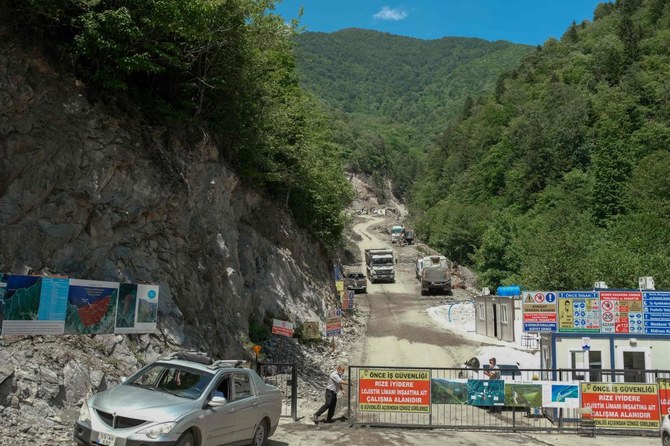
- Up to four million trees were chopped during the construction of Istanbul’s third major bridge, activists say
- Critics argue that Turkey is sacrificing the environment as it develops
PIF’s Alat unveils electrification, AI infrastructure business units

RIYADH: Alat, a flagship company of the Public Investment Fund, unveiled two business units in electrification and AI infrastructure, to establish Saudi Arabia as a premier manufacturing hub globally.
The company unveiled its plans during the Milken Institute Conference held in Los Angeles.
According to a press release, the move comes as part of the PIF company’s strategic vision to spearhead a paradigm shift in industry sustainability while propelling Saudi Arabia on the global stage.
Alat Global CEO Amit Midha said: “I am pleased to announce these two exciting new divisions as they will make a significant contribution to Alat’s overall strategic goal of developing an advanced, sustainable future for the industry.”
The electrification arm will fortify grid technology, catering to the burgeoning demand for electricity driven by exponential growth in renewable energy sources like solar, wind, and hydrogen.
By harnessing Saudi Arabia’s solar energy and other clean resources, the firm seeks to manufacture innovative solutions that will catalyze the global energy transition and drive decarbonization in industry.
The electrification unit will specifically focus on enhancing transmission and distribution technologies, facilitating the integration of renewable energy into existing grids, and pioneering advancements in gas and hydrogen generation and compression technologies.
On the other front, the AI Infrastructure business unit will address the escalating global demand for AI capabilities across industries.
This entails the development of cutting-edge technologies encompassing network and communications equipment, servers, data center networking, storage, industrial edge servers, and Industry 4.0 computing.
“The global electrification market size reached $73.64 billion in 2022 and it is expected to hit around $172.9 billion by 2032, growing at a CAGR of 8.91 percent between 2023 and 2032,” the press release added.
The global AI Infrastructure market is set to hit $460.5 billion by 2033, with a robust 28.3 percent compound annual growth rate, driven by widespread adoption across industries for innovation, decision-making enhancement, and task automation.
As a gold sponsor at the Milken Institute Conference, the firm now has nine business units focused on sustainable technology manufacturing.
“Alat will invest $100 billion by 2030 across these business units to develop key partnerships and build advanced manufacturing capabilities in Saudi Arabia to bring jobs and economic diversification to the Kingdom,” the press release said.
Saudi Arabia’s Qiddiya to build region’s largest water theme park
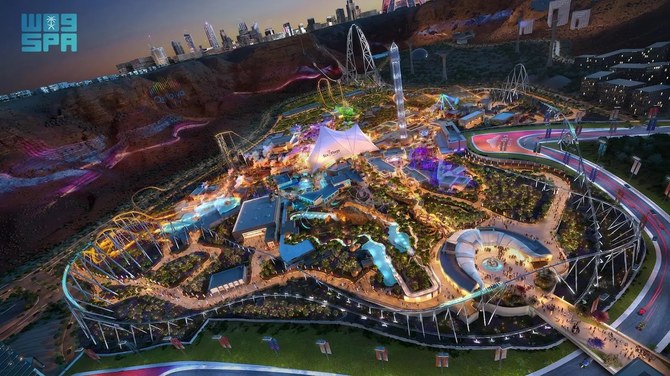
- Aquarabia will also feature the first underwater adventure trip with diving vehicles
RIYADH: Saudi Arabia Qiddiya Investment Co. will construct the region’s largest water theme park as a cornerstone of its Six Flags Qiddiya City venture it was announced on Monday.
To be named Aquarabia, Qiddiya hopes to draw visitors from around the globe with 22 attractions and water experiences suitable for all family members, as well as some “world-first” attractions, Saudi Press Agency reported.
These attractions include the world’s first double water loop, the tallest water coaster with the highest jump, the longest and highest water racing track, and the tallest water slide.
Aquarabia will also feature the first underwater adventure trip with diving vehicles, catering to adventure enthusiasts with water sports areas designated for rafting, kayaking, canoeing, free solo climbing, and cliff jumping.
Additionally, the park will introduce the first surfing pool in the Kingdom, incorporating immersive design elements themed around ancient desert water springs and Qiddiya’s wildlife.
With sustainability in mind, Aquarabia will implement advanced systems capable of reducing water waste by up to 90 percent and decreasing energy consumption. As part of the Six Flags Qiddiya project, the venture, the first Six Flags of its kind outside North America, aims to recycle operational waste, diverting over 80 percent from landfill.
Scheduled to open in 2025, both Aquarabia and Six Flags Qiddiya City are situated within Qiddiya City, forming a fully walkable neighborhood offering a diverse array of activities, accommodations, dining options, and relaxation spots.
Abdullah Al-Dawood, managing director of Qiddiya Investment Co., hailed the announcement as a significant milestone for Qiddiya and the entertainment, tourism, and sports sectors in the Kingdom.
He emphasized that the projects will cater to diverse entertainment needs while contributing to economic diversification and job creation in the tourism sector.
The project also aims to meet the growing local demand for immersive entertainment experiences, particularly in water activities, aligning with the goals of Saudi Arabia’s Vision 2030 to enhance local tourism and employment opportunities.
The unveiling of Aquarabia follows the announcement of several other entertainment, sports, and cultural attractions in Qiddiya, including the world’s first multi-use gaming and electronic sports area, the multi-sport Prince Mohammed bin Salman Stadium and the Dragon Ball amusement park.
Saudi Arabia ascends as key destination for global talent: BCG report

RIYADH: Saudi Arabia has emerged as a key player in attracting global talent amid ongoing geopolitical shifts and financial uncertainty, moving up two spots on the list of preferred countries for workforce mobility.
The “Decoding Global Talent 2024” report by Boston Consulting Group highlights Saudi Arabia’s rise to the 26th most preferred country, underscoring the success of the Kingdom’s strategic initiatives to position itself as a global hub for professionals.
This fourth edition of the study draws insights from over 150,000 professionals across 188 nations, tracking global talent trends since 2014.
Riyadh’s rise to the 54th rank globally underscores its emergence as a hub of opportunity and progress in the eyes of global talent.
Christopher Daniel, managing director and senior partner at BCG, said: “As the global talent shortage becomes an increasingly pressing challenge for the world's foremost economies, Saudi Arabia is emerging as a pivotal player in narrowing this gap.”
He added: “With a significant proportion of respondents citing the quality of job opportunities, the attractive income, tax, and cost of living, as well as the assurance of safety, stability, and security as key reasons for choosing the Kingdom, it’s evident that Saudi Arabia’s strategic investments in its labor market are bearing fruit.”
Daniel noted that the Kingdom is leveraging labor migration to enhance its workforce, offering a secure and hospitable environment that caters to the diverse needs of international professionals.
“By fostering a job market that is attuned to the evolving aspirations of global talent while prioritizing their well-being, Saudi Arabia is positioning itself as a compelling destination for those seeking growth and fulfillment in their careers,” he said.
Furthermore, the report highlights that younger generations and individuals from rapidly expanding populations are particularly attracted to global mobility, pursuing diverse experiences and opportunities for professional growth.
With 23 percent of global professionals actively pursuing international positions and 63 percent remaining receptive, Saudi Arabia is well-positioned to capitalize on this trend.
The Kingdom offers an enriching environment for a globally oriented workforce to excel and progress in their careers, presenting an enticing option for individuals seeking both personal and professional advancement in an ever more interconnected global landscape.
Riyadh Air to expand fleet with additional aircraft orders, CEO reveals

RIYADH: Saudi Arabia’s Riyadh Air plans to bolster its aircraft lineup through additional orders, as it requires “a very large fleet” to establish itself alongside regional giants, stated the CEO.
This move comes as the Kingdom’s second flag carrier, backed by the country’s Public Investment Fund, ordered 39 Boeing 787-9 jets last year, with options for 33 more.
It also aligns well with Saudi Arabia’s goal to expand its aviation industry and attract more tourists, broadening its airline capacity beyond pilgrimage travel, which currently forms the backbone of the country’s inbound tourism.
“We need a very large fleet, we’re going to make a number of additional orders,” CEO of Riyadh Air, Tony Douglas, said in an interview with Bloomberg Television.
He added: “We will be making a narrowbody order, we’ll probably be doing another large order after that to build us up to scale.”
During the interview, Douglas, who previously led the Abu Dhabi flag carrier Etihad Airways, expressed being “very conscious” of potential delays to aircraft deliveries. This concern arises as both Boeing and Airbus SE grapple with production challenges amidst record demand and supply issues at the two plane makers.
The establishment of a second Saudi national airline alongside the existing flag carrier Saudia is part of the Kingdom’s economic diversification plan.
In November 2023, Douglas expressed confidence in the demand for travel. “We’re not well enough connected. It’s as simple as that,” he said at the time.
The new airline stands to benefit from Saudi Arabia’s rapidly growing economy and the increasing influx of tourists to the Kingdom. Riyadh Air does not intend to pursue mergers and acquisitions to fuel its growth. “No, it’s organic,” Douglas emphasized at the time.
The initial destinations will include major cities in Europe, the US East Coast, and Canada, with the inaugural flight scheduled to depart by June 2025.
By that time, Riyadh Air will have secured slots at major airports, Douglas mentioned, although hubs like London Heathrow are already operating close to capacity.
“It won’t be easy ... but we have no reason to be anything other than confident that we’ll resolve all of that,” he said at the time.
Saudi Arabia and Egypt retain top spots in MENA travel preferences: Wego study

RIYADH: Saudi Arabia and Egypt remain dominant destinations among Middle East and North Africa travelers in 2024, retaining top spots in international preferences, according to a study.
Singapore-based travel booking app Wego ranked Egypt as the top destination for tourists from the region between January and April, followed by the Kingdom, with India consistently holding the third spot since 2016.
Saudi Arabia’s second spot on the wish list is a clear indication of the Kingdom’s progress as a global tourist destination, aligning with its National Tourism Strategy aiming to attract 150 million visitors by 2030.
“We are excited to see Egypt emerge as the leading destination for travelers in the MENA region during Q1 2024. According to Wego's data, Egypt stands out as a favored choice among travelers seeking unique cultural experiences and diverse attractions,” said Mamoun Hmedan, chief business officer at Wego.
He added: “Meanwhile, the United Kingdom retains its position as the preferred European destination for Middle Eastern travelers.”
Among Middle East destinations, the top three — Egypt, Saudi Arabia, and UAE —maintained their positions from 2023. Egypt and the Kingdom, in particular, have consistently held the top two spots since Wego began tracking customer trends over a decade ago.
The study utilized traveler searches and hotel booking data from its website as the foundation for its findings.
The report further revealed that the UAE ranked as the fourth favorite destination, followed by Pakistan, Kuwait, and Turkiye.
Meanwhile, China dropped one spot, reaching the 27th top destination among MENA travelers.
The UK remains the top European destination from the Middle East, holding the first spot for 10 of the last 11 years, briefly overtaken during the pandemic. Italy has notably surged from fourth to second.
Italy, a top global tourist spot, consistently ranks in the top ten European destinations for Middle East travelers.
This year marks Italy’s debut in the top three. Joint investments between Saudi Arabia and Italy in late 2023, along with direct flights by ITA Airways to Riyadh and Jeddah, signify growing ties.
Countries farther from the Gulf region, such as Morocco, Indonesia, and the US experienced the most decline among top destinations.
This trend continued in 2024, with Malaysia, the Philippines, and the US dropping out of the global top 10, while Kuwait, Pakistan, and Jordan, which entered the top ten last year, remain preferred destinations for MENA travelers.



